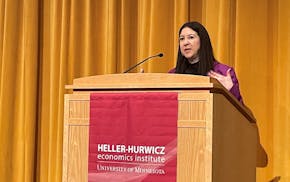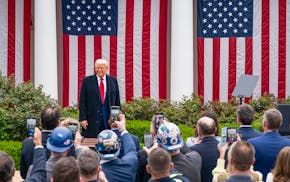President Joe Biden last week capitulated to uneconomic thinking by blocking Nippon Steel's purchase of U.S. Steel. That decision will ultimately harm Minnesota's Iron Range.
U.S. Steel operates two of the iron ore mines in northeast Minnesota, employing about 1,500 workers who unearth and process taconite pellets for steel mills in other parts of the country to turn into steel.
"If they are selling our pellets, we are going to be fine," a local leader of the United Steelworkers told my colleagues Dee DePass and Brooks Johnson after Biden's decision was announced Friday.
The national head of the union said U.S. Steel's recent financial performance shows it can "easily remain a strong and resilient company."
That's just not so. As our story on the reaction to Biden's decision pointed out, U.S. Steel's profit for 2024 is expected to be lower for the third consecutive year. Its revenue is also declining.
Nippon Steel offered the best hope for U.S. Steel's traditional mills, fed by Minnesota's ore, and its prospects for a financial rebound.
U.S. Steel executives think the far larger Japanese firm has the resources and know-how to upgrade and stabilize U.S. Steel's operations. Without a deal, those U.S. Steel execs threaten to close old mills in Pennsylvania and its headquarters in Pittsburgh, shifting resources to newer mills in the southern U.S. that aren't fed by taconite.
The United Steelworkers want U.S. Steel to be sold to a different steelmaker, Cleveland-Cliffs, whose executives made big job security promises to the union. Through acquisitions, Cleveland-Cliffs recently surpassed U.S. Steel in revenue, and it happens to be the only other operator of iron mines in Minnesota.
On Monday, Nippon Steel and U.S. Steel sued Cleveland-Cliffs and the United Steelworkers for "engaging in a coordinated series of anti-competitive and racketeering activities" to block the deal.
News coverage of this battle frequently mentions the importance of America's steel industry. Biden cited national security reasons for not allowing U.S. Steel to be owned by a Japanese firm, even though Japan is one of the country's closest allies.
Nippon Steel tried to assuage critics' concerns by offering to spend $2.7 billion on improvements to U.S. Steel sites and to let the U.S. government veto any proposal to cut production at a U.S. Steel plant.
It wasn't enough. Though I suspect it would have been if Pennsylvania was not both a swing state and U.S. Steel's home.
You may be surprised to hear if U.S. Steel was based in Minnesota, it would only rank ninth on our annual list of the state's largest public companies.
U.S. Steel — formed in 1901 when financier J.P. Morgan merged Andrew Carnegie's steel company with nine others to make the world's first billion-dollar corporation — today produces less annual revenue than C.H. Robinson Worldwide, the Eden Prairie-based shipping and logistics company, and just a bit more than Ameriprise, the Minneapolis-based investment services firm.
Cleveland-Cliffs is a little larger, with about the same annual revenue as General Mills. By purchasing U.S. Steel, it can become as big as Richfield-based Best Buy.
If it does get U.S. Steel, Cleveland-Cliffs will wind up owning all the iron mines in Minnesota.
With monopoly power, I'd bet taconite production will be one of the first places the leaders of Cleveland-Cliffs cut jobs and other costs to help finance a purchase of U.S. Steel.
Some readers on the Range may think I'm being too negative, perhaps even paranoid.
So let's consider what's going on with a more recent symbol of America's industrial might.
In 1996, one of the top business executives of the day, Intel Corp. CEO Andy Grove, published a book called "Only the Paranoid Survive" that described strategies for leading a company whose relative position is changing within an industry that's also changing. Intel at the time had survived two major threats to its existence.
"The people who are immune to the inertia of business or less entrapped with the tradition of the business respond to the new reality," Grove said back then. "The people who are tradition-bound do not. So they move apart."
When that happens, he added, front-line employees respond first and a company's leaders become followers. "Which is OK if they recognize it after a while and they become leaders again," Grove said.
Lately, it's become clear that after dominating the PC age Intel is falling behind other firms in the age of smartphones and AI. A few days ago, an analyst mentioned Grove's book to Wall Street Journal columnist Christopher Mims.
"The book is literally about the importance of not missing strategic inflections," the analyst told Mims, referring to moments when innovations create turning points for business. "And then Intel proceeds to miss every strategic inflection since."
Ramstad: This could be the week the NCAA becomes a professional league
Ramstad: Effort to change the ban on noncompetes emerges in the Legislature
Ramstad: What does 'Made in the USA' mean? Minnesota businesses like Nordic Ware are questioned.

Ramstad: Economic growth is becoming harder to achieve, but the U.S. has been managing it


